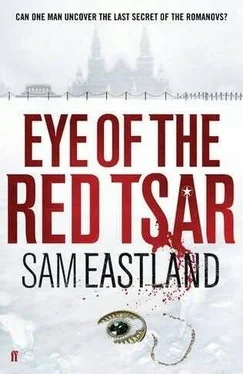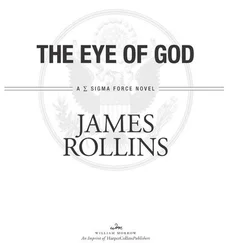“I could see the flash of guns going from room to room. When the shooting stopped, the front door flew open and I saw Katamidze come tearing out of the house. He went running off into the dark.”
“Do you think Katamidze was involved in the gunfight?” asked Pekkala.
Mayakovsky laughed. “If you gave Katamidze a gun, he wouldn’t know which end the bullets came out of. If you’re thinking he was brave enough to attack the Ipatiev house and rescue the Tsar, you don’t know Katamidze.”
“What happened after Katamidze left?” Pekkala asked.
“About twenty minutes later, the second Cheka truck pulled out of the courtyard and headed off in the opposite direction from the first truck. That was the Romanovs. They were getting away, along with the man who rescued them. It wasn’t long afterwards that the first truck returned. The Cheka realized they’d been tricked. That’s when all hell broke loose. The guards had been killed. I heard one of the Cheka yell that the Romanovs had escaped.”
“How do you know the guards were killed?”
“Because I saw their bodies being carried out into the courtyard the next day. I didn’t see the bodies of the Romanovs. That’s how I knew they’d escaped. It’s the truth, no matter what the papers had to say about it.”
For a moment, there was silence in the room, except for the faint wheeze of Mayakovsky smoking his pipe.
“That man who came to the door,” said Kirov. “Did you see his face?”
Pekkala glanced at Kirov.
Kirov ’s face reddened. “What I meant was-”
Anton interrupted him. “Yes, what did you mean exactly, Junior Man? I did not realize you had taken over this investigation.”
Mayakovsky watched this, like a man following the ball at a tennis match.
“That’s all right.” Pekkala nodded at Kirov. “Continue.”
Anton threw his hands up in the air. “Now we’re really making progress.”
Kirov cleared his throat. “Can you describe the man you saw that day, Mayakovsky?”
“He had his back to me. It was dark.” Mayakovsky picked at something stuck between his front teeth. “I don’t know who he was, but I’ll tell you who they say rescued the Tsar.”
“Who’s they?” Pekkala interposed.
“They!” Mayakovsky shrugged. “They do not have a name. They are voices. All different voices. They come together and that’s how you know what they say.”
“All right,” said Kirov. “Who do they say it was?”
“A famous man. A man I wish I’d met.”
“And who is that?”
“Inspector Pekkala,” said Mayakovsky. “The Emerald Eye himself. That’s who rescued the Tsar.”
The three men had been leaning forward, but now they slumped back in their seats. All three of them let out a sigh.
“What’s the matter?” demanded Mayakovsky.
“The matter,” replied Kirov, “is that the Emerald Eye is sitting right in front of you.” He gestured vaguely at Pekkala.
The old man took the pipe from his mouth and aimed the stem at Pekkala. “Well, you do get around, don’t you?”
Less than twenty-four hours after he had said good-bye to the Tsar, Pekkala was arrested by a detachment of Red Guard Railway Police at a tiny station called Vainikkala. The situation along the border was still chaotic. Some stations were manned by Finnish personnel, while other stations even farther west were under Russian control. One of these was Vainikkala.
It was late at night when the Guards boarded the train. Their uniforms were made of coarse black wool with collars piped in cherry red, and on their right sleeves they wore homemade red armbands on which someone had drawn the sign of a hammer and a plow, soon to be replaced by a hammer and sickle as the symbol of the Soviet Union. They wore black, short-brimmed hats to match their uniforms, with a large red star sewn on the front.
Pekkala’s forged papers listed him as a doctor of obstetrics. The papers had been made for him some time ago by the Okhrana’s printing service on the orders of the Tsar. Until the Tsar handed him these documents, Pekkala had not even known the Okhrana ran a printing service. The papers were perfect, complete with photograph, all relevant stamps, and handwritten signatures on multiple travel permits. His papers were not why he was stopped.
Pekkala’s mistake had been to raise his head and look one of the Guards in the eye as three of them made their way down the narrow corridor of the train. Snow was melting on the Guards’ shoulders and condensation beaded on their weapons.
The lead Guard had tripped on the carrying strap of a bag stuffed under a seat several rows ahead of where Pekkala sat. He stumbled and fell heavily to one knee, swearing coarsely. People in the carriage flinched at the torrent of obscenities. The Guard’s head snapped up. He was furious and embarrassed to have tripped. The first person he saw was Pekkala, who just happened, at that moment, to be looking back at him.
“Let’s go,” snarled the Guard, and hauled Pekkala to his feet.
Pekkala’s first breath of cold air as he left the train felt like pepper in his lungs.
A dozen people, most of them men but a few pretty women as well, had been taken off the train. They stood huddled on the platform. The name of the station was barely visible under its coral-like coating of frost.
The train stamped and snorted, impatient to push on into the night, bound for Helsinki.
Pekkala weighed the situation in his head. He knew these men were probably just former soldiers, not professionals who could spot well-forged papers or know what questions to ask to trip up a man who was not who he was supposed to be. One well-aimed question about obstetrics could have punched a hole through Pekkala’s disguise. There had been no time for him to research his new profession.
The Webley was strapped against Pekkala’s chest. He could easily have shot the one man guarding them and run away into the dark while the others continued their search of the train. But one glance into the thick, snow-filled forests which surrounded the station and Pekkala knew he wouldn’t get far. Even if they didn’t catch him, he would most likely freeze to death.
There was nothing to do but hope that the Guards had satisfied their curiosity and their need for feeling important. Then they could all just get back on the train.
His plan had been to visit his parents, then press on via Stockholm to Copenhagen and from there down to Paris. There he would begin his search for Ilya.
The rest of the Guards disembarked.
Passengers rubbed circles on the condensation-soaked windows to see what was happening outside.
The Guard who had tripped made his way down the line of those who had been detained, examining their papers. He was a little too large for his tunic, whose sleeves stopped well above his wrists. A lit cigarette hung from between his lips, and when he spoke he sounded like a man with nerve damage to his face.
“All right,” he told one of the passengers. “You can go.”
The man did not look back. He ran to get aboard the train.
Two women who had been ahead of Pekkala and who had not been told to get on board stood weeping in the glare of the station lights. It had begun to snow and the shadows of flakes passed huge as clouds over the frozen platform.
The Guard came to Pekkala. “A doctor,” he said.
“Yes, sir.” Pekkala kept his head lowered.
“What is this bone?” asked the man.
And then Pekkala knew he was trapped. Not because he could not name the bones of the human body. For years a chart of the human body had hung in his father’s mortuary room; there were few bones he could not name. The reason Pekkala knew he was trapped was that if he made eye contact with the Guard, there was no chance that he would be allowed to leave. It was no different than if he had been standing in front of a dog. To the Guard, it had become a game.
Читать дальше










